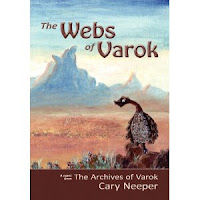The best science-fiction/fantasy novels are ones that lie outside the stereotypes of either genre. I abhor reading fantasy just for fantasies' sake. Why escape to another world when you return to the same world as the same person? I like to have meaning in my books, something with meat on it, that I can rip away and take with me. Certainly, there will be a few times when Anne McCaffrey's books will call to me, something light, but usually, I want something more along the lines of Orson Scott Card, where larger moral issues are addressed. In fact, when I read and review books, especially of the sci-fi variety, my question always is, "How would OSC write this?" If I find the answer is, "Just like this," then I know I've found a good book. And such is The Webs of Varok by Cary Neeper.
What surprised me was that this wasn't the first book in this series, but the second. Neeper wrote a book about Alien first contact in 1975, called A Place Beyond Man (which was redone in 2011 as The View Beyond Earth). However, it's not completely necessary to read the other book to understand what's going on. The prologue does an ample job of getting everything set. Further, the forward tells us that what Neeper is trying to do is to create a society with a self-sustaining environment, incorporating population control, a regulatory business trade, and a Utopian system of government based on the idea that citizens are content to live their lives within the confines of regulations in order to prevent the previous cataclysms where ecological and economical systems spiraled out of control. In fact, the book is more about this idea than anything else, leading one to believe that the plot means nothing and that it's going to be the author preaching at us the whole time. This is very far from being true.
The characters, Tandra, the human, Conn, the Elll, and Orram, the Varok, are all very well constructed, done with dialogue, much as OSC would do. In fact, Neeper does an amazing job creating all of the sentient beings on Jupiter's hidden moon. Ellls are aquatic beings who survive on land using clothing that remains wet. They are sensuous beings, outgoing and social. The Varoks, for whom the moon is named, were the main sentient beings until whatever cataclysm befell upon them (a biological war, as it turns out), ripping apart their sense of touch. They have relied upon their development of mental communication, reading each other's minds. In fact, this is the main crux of the novel, that Varoks cannot lie to each other. This keeps the world in check, for no one is able to do anything illegal without being caught. This is the same outcome of Clarke & Baxter's technology of wormhole usage in The Light of Other Days. Thus the world can operate completely differently than Earth. The downside of this is that Neeper (as the characters in the book) would recommend using the same regulations of Varok here on Earth, in present day society. This, of course, is impossible, because human nature will not acquiesce to total regulation by a government. It was tried before, called Communism, and it didn't work, for precisely that reason.
I remember walking through the park here in Conyers, and trying to come up with a society that could live in harmony with the beauty that I was seeing around me. And having read Ayn Rand and being against governmental control of the individual, I tried to overcome the weaknesses of Rand's world and our own. The only way I could do it was with population control and economic controls that would forbid companies from making forced obsolescence a part of the economic system (see my blog on the forever light bulb coming from Clifford D. Simak's book Ring Around the Sun. In fact, when I stopped thinking about it that day, I had come up with a society very similar to Neeper's Varok, but with the large problem of making people honest with themselves and others. Only a biological or technological breakthrough would accomplish this.
I give The Webs of Varok 4/5 stars on the systems of Goodreads and others because of a couple of plot issues that happen late in the book that threw me off. It might be that something distracted me at the sentence where Orram's disappearance happened, or something. It's not always the book's fault, but I can't reconcile it. I do recommend the book, even to conservatives who would find reading a book written with liberal ideas repulsive. You'll like it. You'll even agree with most of the ideas in the book. They are ideals that conservatives and liberals must strive for (and the goals are usually the same, just arrived at in two totally different ways). I have the first book (75) version, and will get the '11 version, too, and see what differences there are. It looks like the '75 book deals with the differences between the three species, especially those of social and sensual nature. I hope that these books are done as well as this book. I look forward to reading them.
Subscribe to:
Post Comments (Atom)

No comments:
Post a Comment